Reflective Practice: Career Journey Analysis Report
VerifiedAdded on 2021/04/17
|5
|1101
|283
Report
AI Summary
This report presents a reflective practice analysis of an interview with a human resource director, focusing on their career journey and applying Gibb's reflective cycle. The interviewee's experience, spanning over forty years, is examined, highlighting their progression from an intern to a director. The analysis explores the influence of personal experiences and personality traits, such as introversion and emotional intelligence, on career choices. The report discusses the interviewee's shift from compensation and benefits to employee assistance, connecting this to Herzberg's two-factor theory. The successful career trajectory is evaluated, emphasizing the importance of setting clear career goals, including SMART goals, for achieving professional aspirations. The report concludes by highlighting the value of reflective practice in connecting classroom concepts to real-world career scenarios and the potential for students to achieve their career goals.
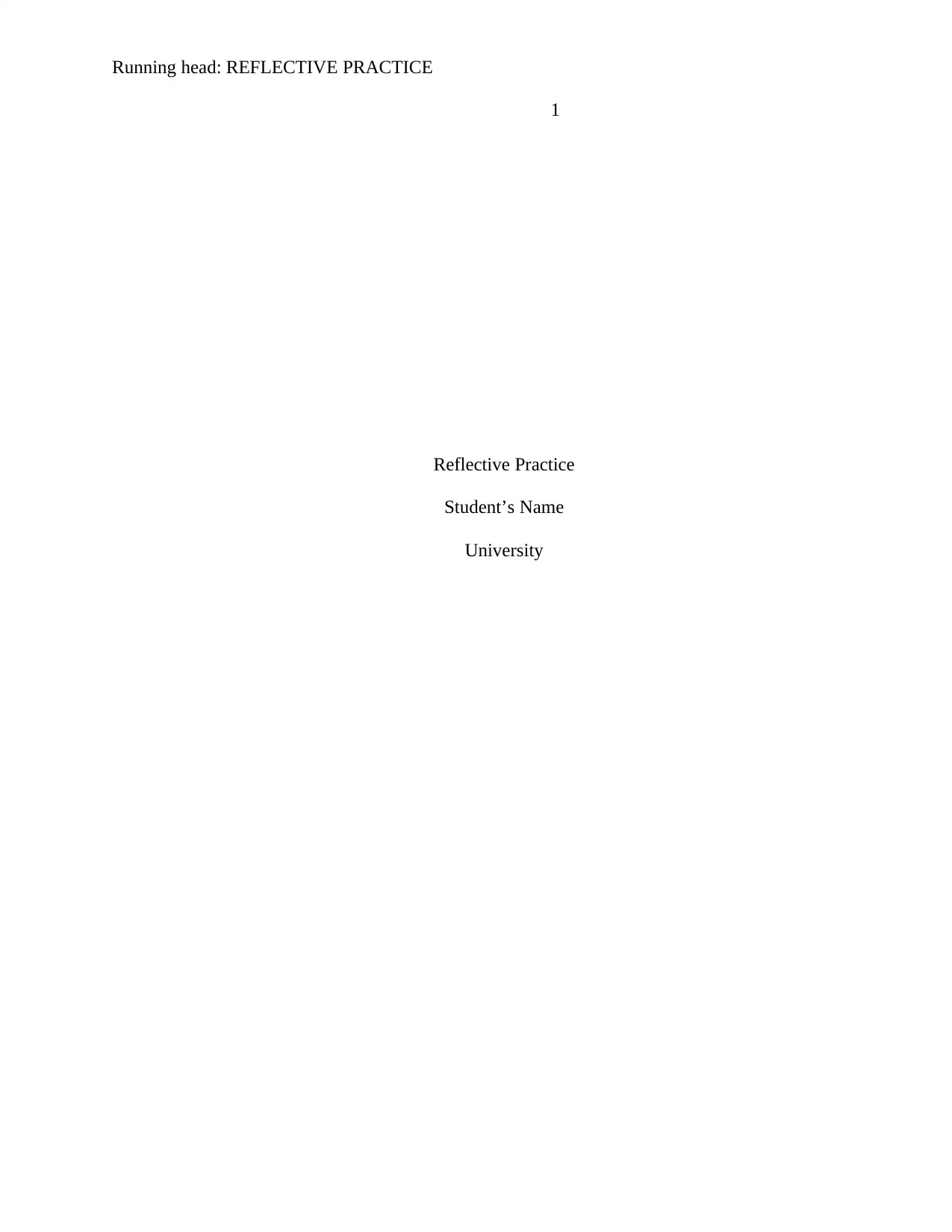
Running head: REFLECTIVE PRACTICE
1
Reflective Practice
Student’s Name
University
1
Reflective Practice
Student’s Name
University
Paraphrase This Document
Need a fresh take? Get an instant paraphrase of this document with our AI Paraphraser
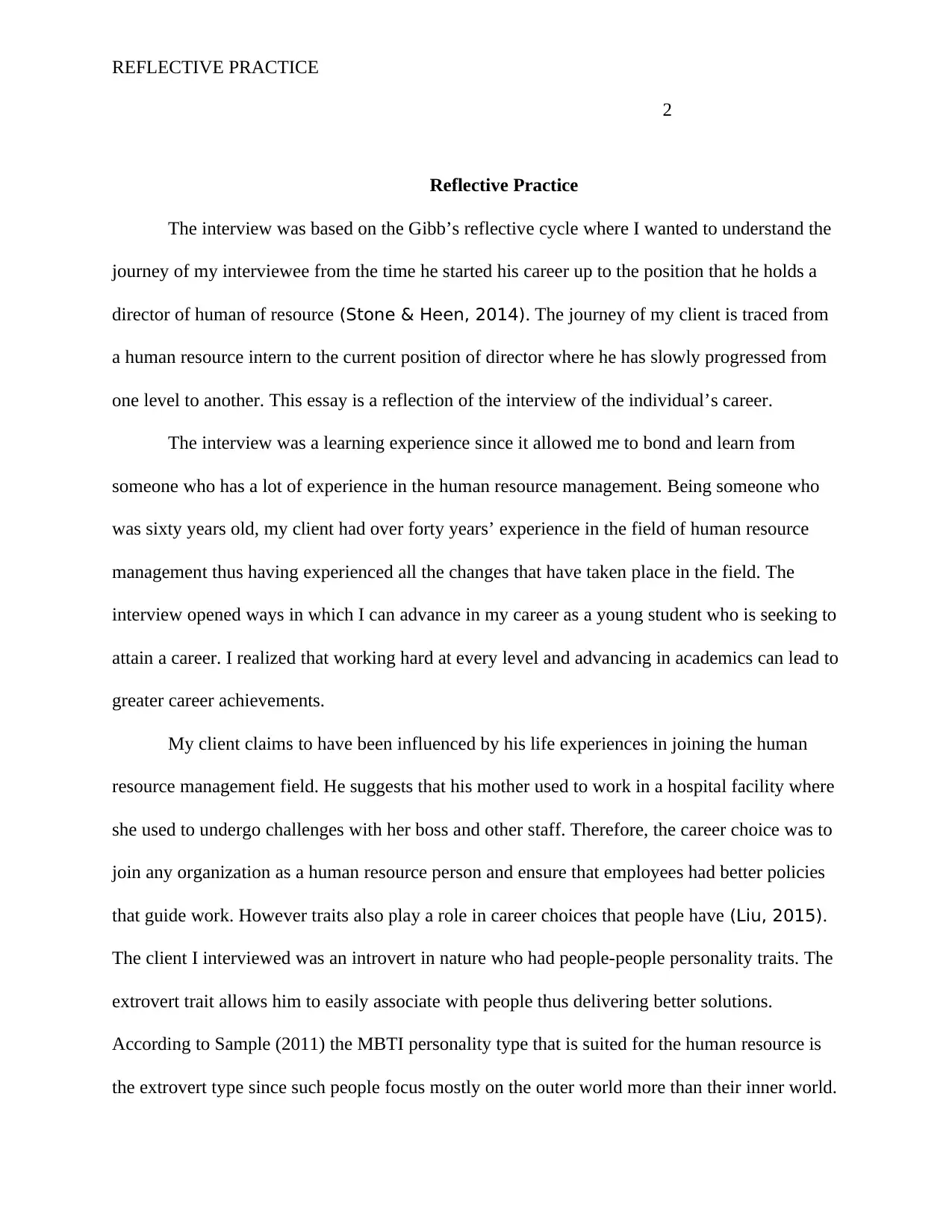
REFLECTIVE PRACTICE
2
Reflective Practice
The interview was based on the Gibb’s reflective cycle where I wanted to understand the
journey of my interviewee from the time he started his career up to the position that he holds a
director of human of resource (Stone & Heen, 2014). The journey of my client is traced from
a human resource intern to the current position of director where he has slowly progressed from
one level to another. This essay is a reflection of the interview of the individual’s career.
The interview was a learning experience since it allowed me to bond and learn from
someone who has a lot of experience in the human resource management. Being someone who
was sixty years old, my client had over forty years’ experience in the field of human resource
management thus having experienced all the changes that have taken place in the field. The
interview opened ways in which I can advance in my career as a young student who is seeking to
attain a career. I realized that working hard at every level and advancing in academics can lead to
greater career achievements.
My client claims to have been influenced by his life experiences in joining the human
resource management field. He suggests that his mother used to work in a hospital facility where
she used to undergo challenges with her boss and other staff. Therefore, the career choice was to
join any organization as a human resource person and ensure that employees had better policies
that guide work. However traits also play a role in career choices that people have (Liu, 2015).
The client I interviewed was an introvert in nature who had people-people personality traits. The
extrovert trait allows him to easily associate with people thus delivering better solutions.
According to Sample (2011) the MBTI personality type that is suited for the human resource is
the extrovert type since such people focus mostly on the outer world more than their inner world.
2
Reflective Practice
The interview was based on the Gibb’s reflective cycle where I wanted to understand the
journey of my interviewee from the time he started his career up to the position that he holds a
director of human of resource (Stone & Heen, 2014). The journey of my client is traced from
a human resource intern to the current position of director where he has slowly progressed from
one level to another. This essay is a reflection of the interview of the individual’s career.
The interview was a learning experience since it allowed me to bond and learn from
someone who has a lot of experience in the human resource management. Being someone who
was sixty years old, my client had over forty years’ experience in the field of human resource
management thus having experienced all the changes that have taken place in the field. The
interview opened ways in which I can advance in my career as a young student who is seeking to
attain a career. I realized that working hard at every level and advancing in academics can lead to
greater career achievements.
My client claims to have been influenced by his life experiences in joining the human
resource management field. He suggests that his mother used to work in a hospital facility where
she used to undergo challenges with her boss and other staff. Therefore, the career choice was to
join any organization as a human resource person and ensure that employees had better policies
that guide work. However traits also play a role in career choices that people have (Liu, 2015).
The client I interviewed was an introvert in nature who had people-people personality traits. The
extrovert trait allows him to easily associate with people thus delivering better solutions.
According to Sample (2011) the MBTI personality type that is suited for the human resource is
the extrovert type since such people focus mostly on the outer world more than their inner world.
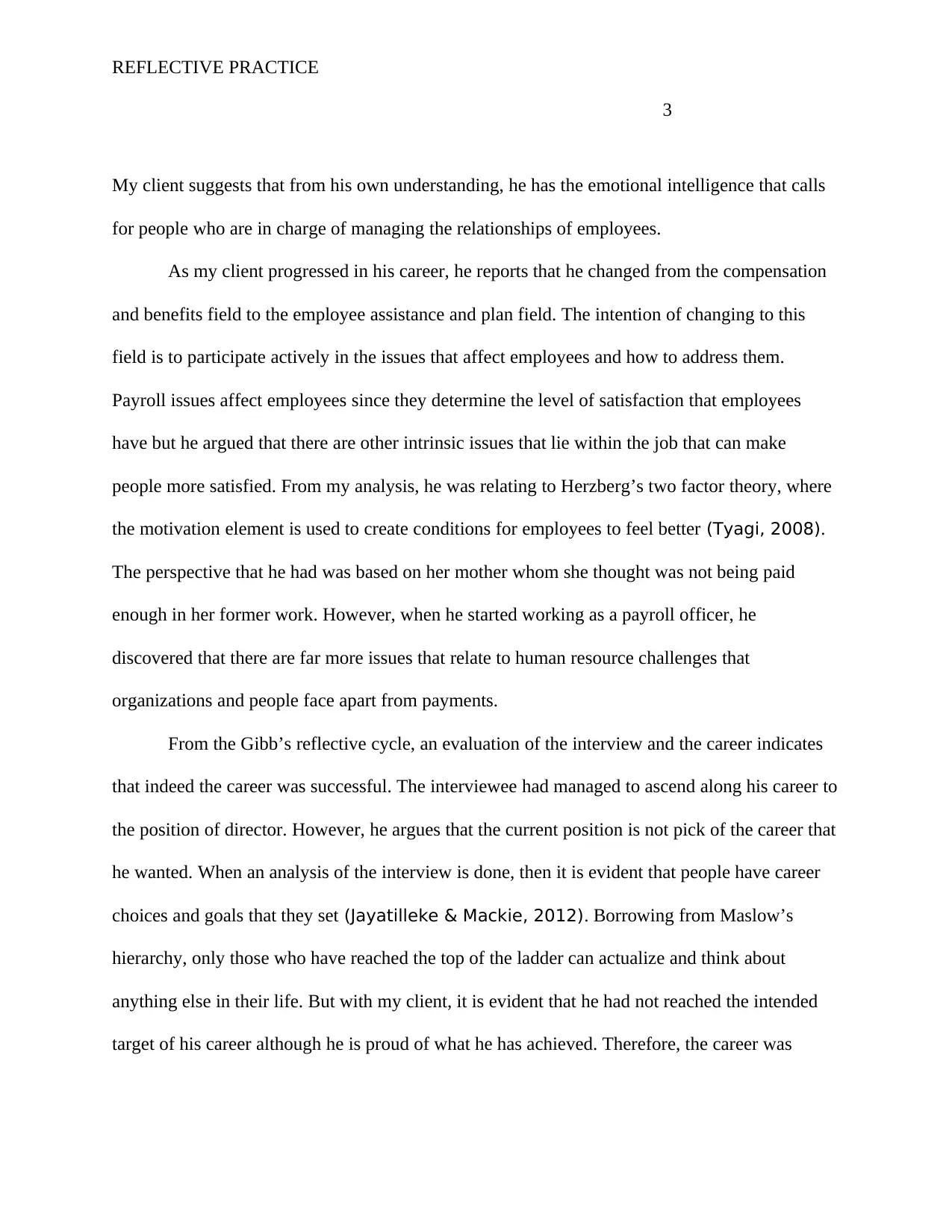
REFLECTIVE PRACTICE
3
My client suggests that from his own understanding, he has the emotional intelligence that calls
for people who are in charge of managing the relationships of employees.
As my client progressed in his career, he reports that he changed from the compensation
and benefits field to the employee assistance and plan field. The intention of changing to this
field is to participate actively in the issues that affect employees and how to address them.
Payroll issues affect employees since they determine the level of satisfaction that employees
have but he argued that there are other intrinsic issues that lie within the job that can make
people more satisfied. From my analysis, he was relating to Herzberg’s two factor theory, where
the motivation element is used to create conditions for employees to feel better (Tyagi, 2008).
The perspective that he had was based on her mother whom she thought was not being paid
enough in her former work. However, when he started working as a payroll officer, he
discovered that there are far more issues that relate to human resource challenges that
organizations and people face apart from payments.
From the Gibb’s reflective cycle, an evaluation of the interview and the career indicates
that indeed the career was successful. The interviewee had managed to ascend along his career to
the position of director. However, he argues that the current position is not pick of the career that
he wanted. When an analysis of the interview is done, then it is evident that people have career
choices and goals that they set (Jayatilleke & Mackie, 2012). Borrowing from Maslow’s
hierarchy, only those who have reached the top of the ladder can actualize and think about
anything else in their life. But with my client, it is evident that he had not reached the intended
target of his career although he is proud of what he has achieved. Therefore, the career was
3
My client suggests that from his own understanding, he has the emotional intelligence that calls
for people who are in charge of managing the relationships of employees.
As my client progressed in his career, he reports that he changed from the compensation
and benefits field to the employee assistance and plan field. The intention of changing to this
field is to participate actively in the issues that affect employees and how to address them.
Payroll issues affect employees since they determine the level of satisfaction that employees
have but he argued that there are other intrinsic issues that lie within the job that can make
people more satisfied. From my analysis, he was relating to Herzberg’s two factor theory, where
the motivation element is used to create conditions for employees to feel better (Tyagi, 2008).
The perspective that he had was based on her mother whom she thought was not being paid
enough in her former work. However, when he started working as a payroll officer, he
discovered that there are far more issues that relate to human resource challenges that
organizations and people face apart from payments.
From the Gibb’s reflective cycle, an evaluation of the interview and the career indicates
that indeed the career was successful. The interviewee had managed to ascend along his career to
the position of director. However, he argues that the current position is not pick of the career that
he wanted. When an analysis of the interview is done, then it is evident that people have career
choices and goals that they set (Jayatilleke & Mackie, 2012). Borrowing from Maslow’s
hierarchy, only those who have reached the top of the ladder can actualize and think about
anything else in their life. But with my client, it is evident that he had not reached the intended
target of his career although he is proud of what he has achieved. Therefore, the career was
⊘ This is a preview!⊘
Do you want full access?
Subscribe today to unlock all pages.

Trusted by 1+ million students worldwide
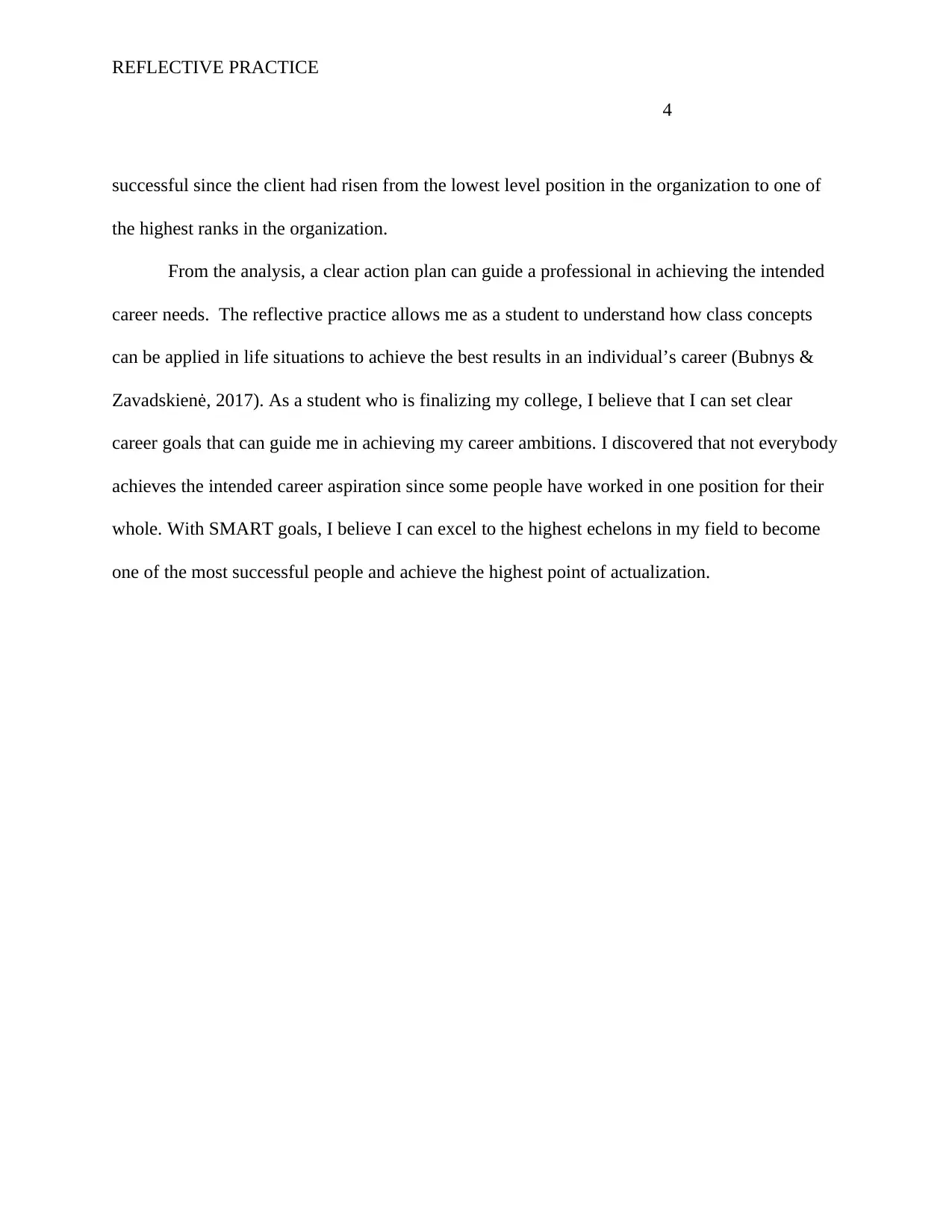
REFLECTIVE PRACTICE
4
successful since the client had risen from the lowest level position in the organization to one of
the highest ranks in the organization.
From the analysis, a clear action plan can guide a professional in achieving the intended
career needs. The reflective practice allows me as a student to understand how class concepts
can be applied in life situations to achieve the best results in an individual’s career (Bubnys &
Zavadskienė, 2017). As a student who is finalizing my college, I believe that I can set clear
career goals that can guide me in achieving my career ambitions. I discovered that not everybody
achieves the intended career aspiration since some people have worked in one position for their
whole. With SMART goals, I believe I can excel to the highest echelons in my field to become
one of the most successful people and achieve the highest point of actualization.
4
successful since the client had risen from the lowest level position in the organization to one of
the highest ranks in the organization.
From the analysis, a clear action plan can guide a professional in achieving the intended
career needs. The reflective practice allows me as a student to understand how class concepts
can be applied in life situations to achieve the best results in an individual’s career (Bubnys &
Zavadskienė, 2017). As a student who is finalizing my college, I believe that I can set clear
career goals that can guide me in achieving my career ambitions. I discovered that not everybody
achieves the intended career aspiration since some people have worked in one position for their
whole. With SMART goals, I believe I can excel to the highest echelons in my field to become
one of the most successful people and achieve the highest point of actualization.
Paraphrase This Document
Need a fresh take? Get an instant paraphrase of this document with our AI Paraphraser
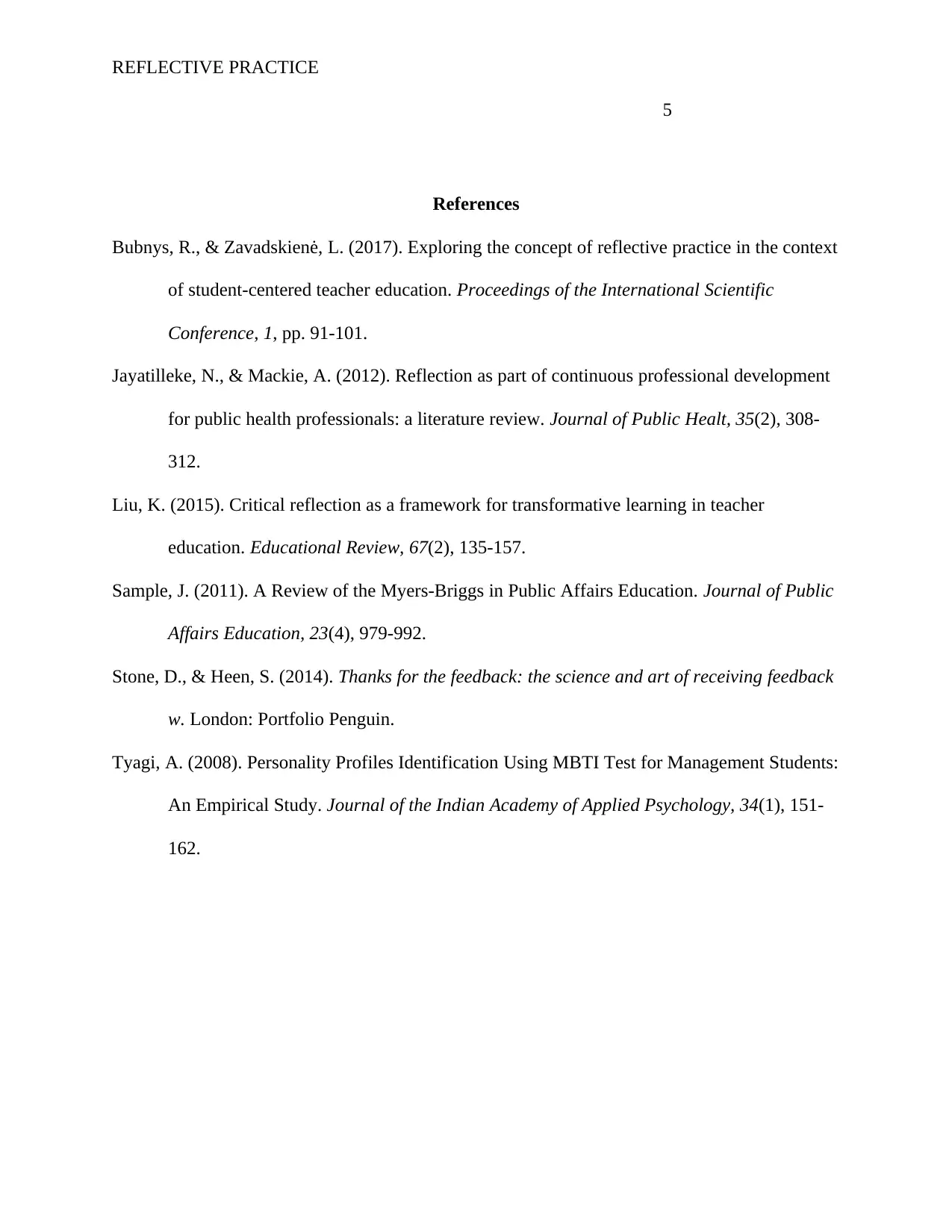
REFLECTIVE PRACTICE
5
References
Bubnys, R., & Zavadskienė, L. (2017). Exploring the concept of reflective practice in the context
of student-centered teacher education. Proceedings of the International Scientific
Conference, 1, pp. 91-101.
Jayatilleke, N., & Mackie, A. (2012). Reflection as part of continuous professional development
for public health professionals: a literature review. Journal of Public Healt, 35(2), 308-
312.
Liu, K. (2015). Critical reflection as a framework for transformative learning in teacher
education. Educational Review, 67(2), 135-157.
Sample, J. (2011). A Review of the Myers-Briggs in Public Affairs Education. Journal of Public
Affairs Education, 23(4), 979-992.
Stone, D., & Heen, S. (2014). Thanks for the feedback: the science and art of receiving feedback
w. London: Portfolio Penguin.
Tyagi, A. (2008). Personality Profiles Identification Using MBTI Test for Management Students:
An Empirical Study. Journal of the Indian Academy of Applied Psychology, 34(1), 151-
162.
5
References
Bubnys, R., & Zavadskienė, L. (2017). Exploring the concept of reflective practice in the context
of student-centered teacher education. Proceedings of the International Scientific
Conference, 1, pp. 91-101.
Jayatilleke, N., & Mackie, A. (2012). Reflection as part of continuous professional development
for public health professionals: a literature review. Journal of Public Healt, 35(2), 308-
312.
Liu, K. (2015). Critical reflection as a framework for transformative learning in teacher
education. Educational Review, 67(2), 135-157.
Sample, J. (2011). A Review of the Myers-Briggs in Public Affairs Education. Journal of Public
Affairs Education, 23(4), 979-992.
Stone, D., & Heen, S. (2014). Thanks for the feedback: the science and art of receiving feedback
w. London: Portfolio Penguin.
Tyagi, A. (2008). Personality Profiles Identification Using MBTI Test for Management Students:
An Empirical Study. Journal of the Indian Academy of Applied Psychology, 34(1), 151-
162.
1 out of 5
Related Documents
Your All-in-One AI-Powered Toolkit for Academic Success.
+13062052269
info@desklib.com
Available 24*7 on WhatsApp / Email
![[object Object]](/_next/static/media/star-bottom.7253800d.svg)
Unlock your academic potential
Copyright © 2020–2026 A2Z Services. All Rights Reserved. Developed and managed by ZUCOL.




